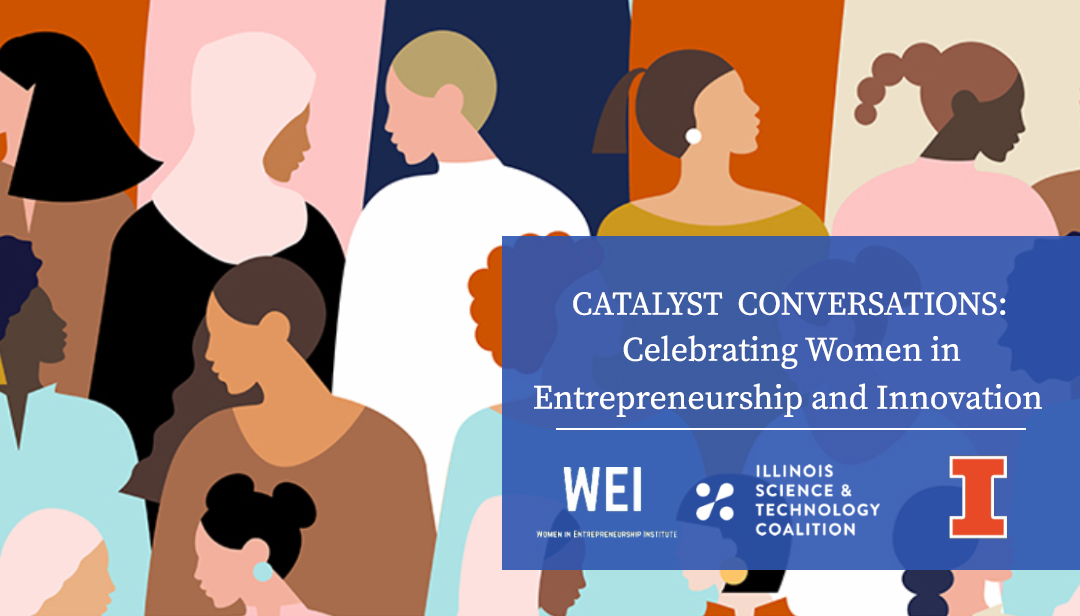Celebrating Women Within Innovation
Last week, Friday (11/19/21) was Women’s Entrepreneurship Day–a celebration of the countless women who are so vital to the advancement of innovation and economic growth around the world. In this month’s Catalyst, we highlight a few women leading innovation efforts within Illinois and discuss the importance of creating equity in these spaces of influence with Abigail Ingram, Director of DePaul’s Women in Entrepreneurship Institute.
As it relates to entrepreneurship, in the United States alone, approximately 4 out of every 10 businesses is owned by a woman, generating close to $2 trillion dollars annually, yet they receive only 2.3% of venture capital funding, differing even further by race.
Clearly, the work of creating more opportunities for women within innovation and business has further room for improvement. However, the days when women were completely left out of the conversation are beginning to change, and the ISTC is proud to spotlight some of our partners and collaborators who are paving the way for women to have those seats at the table.

Laura Frerichs, Director of the University of Illinois Research Park

Priya Parrish, Managing Partner of Private Equity and the Chief Investment Officer at Impact Engine

Abigail Ingram, The Women in Entrepreneurship Institute at DePaul
We measure our success by the success of the women-owned businesses that we work with. So when I look at what “winning” looks like for us, it really comes down to “are we creating economic opportunities for other people?…Is there economic empowerment work being done?” and the answer to that question has been a resounding yes. During the past year of the pandemic, 8% of women-owned businesses increased revenues nationwide…69% of our businesses increased revenues. And 98.7% of employees at businesses at the WEI are still employees; that’s the retention rate. We’re looking at whether businesses are profitable and if they’re not, [we’re helping them get] to profitability. We’re also looking at whether they’re increasing their revenues, creating jobs, and retaining them. Only 10% of women-owned businesses have employees nationwide, while over 75% of businesses at the WEI employ other people.
We’re also powered by our board. We have women entrepreneurs who have gone through every imaginable situation for entrepreneurs themselves who are now developing the delivering content to this next generation…and our entrepreneurs now have access to these powerhouses.
What I typically hear is that the work we do is really impactful because it’s specifically designed for women. When we first launched we were focused on maintaining a healthy attrition rate. We wanted to know whether people were staying in our programs and getting the full benefit or whether they’re bailing for whatever reason. At university supported incubators, we found a 70% attrition rate for women compared to the 40% attrition rate overall…so in untangling why that might be and the demographics of the mentors and design of the program…the first thing we did was pull the whole thing apart to check for biases and build something that was designed by women for women. I think the awareness that we have different lived experiences…should lead us to say “let’s talk about opening up networks in a way that’s not just diverse but inclusive”…I think that’s where the economic power really unlocks.
“It benefits society as a whole…it benefits the U.S. as a country if everybody gets to play.
If we keep women out of the innovation and entrepreneurship spaces, women being 51% of the population, the GDP is going to be half of what it should be. It benefits society as a whole…it benefits the U.S. as a country, if everybody gets to play. Economically, if you’re not talking to women, you’re not talking to 80% of the consumer purchases in the U.S.
I use all of these examples because i think it makes a business case, and it makes me pretty angry that I have to make a business case, because I’d hope that in 2021, we’d be at a place where we can use the idea of equity and fairness as strong enough where i don’t need to justify in terms of statistics. Boston Consulting Group did a study on the ROI of investments in women owned businesses and it’s higher than that of men owned invested businesses…so why are we only giving women 2.2% of VC if they’re going to do a better job with it?
What kinds of programming are you excited to launch soon?
We started off with our accelerator program, because that’s where we identified the need, and next year, we’ll be adding a pre-accelerator that will be added before the program. This program is designed to help businesses gain confidence in what they do and who their customers are before scaling their companies…so that when you get into the accelerator you’re ready to go full steam ahead with the messaging, marketing and deep dive into your financial reporting and projections. We’ll also be launching an alumnae program…we want to provide support to the women in our program forever. We’re growing, so we need to have something a bit more formalized, so every month having women tell us what they need and designing programming that’s based on the needs that they have.
How can others support you or be involved with the work WEI is doing?
Ultimately, we need to serve more women. I had somebody ask me a few weeks ago, “why doesn’t every business in Chicago have the successes you’re reporting for the companies you work with?” And I was like “whoa, we should probably get on that” because we haven’t gotten that far yet. I don’t think there’s a single women owned business who is ready for and wants the assistance that we provide, that shouldn’t be able to access our programming…so if you know of any women business owners who are between that $50,000 and $1MM mark (and only 1.6% of women owned businesses ever vault over that million-dollar mark) I would love to have a conversation. For those who have reached a level of success and are ready to give back, I am happy to involve them in some way at the WEI so that they can share their knowledge and that we can keep this cycle going.
To learn more about the program offerings at the Women in Entrepreneurship Institute at DePaul University, visit their website below
Women Entrepreneurship Institute Information

